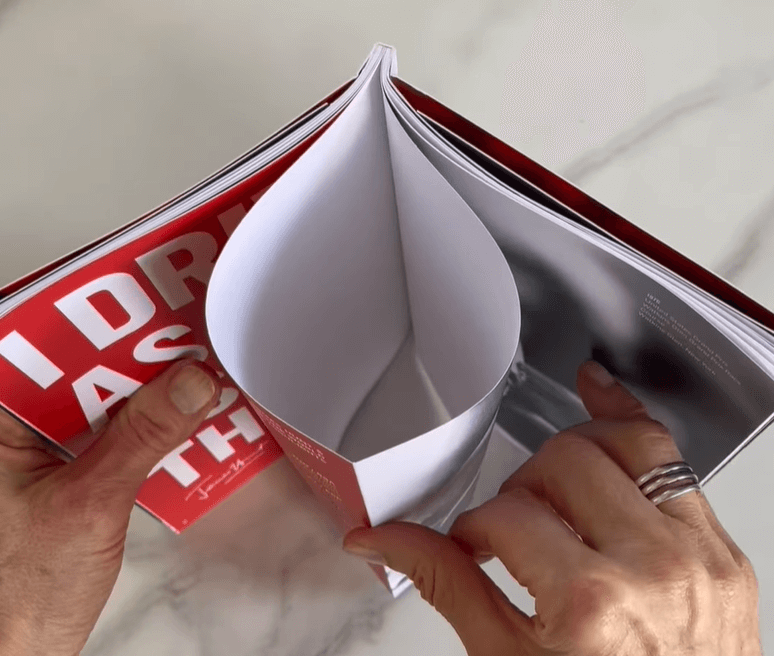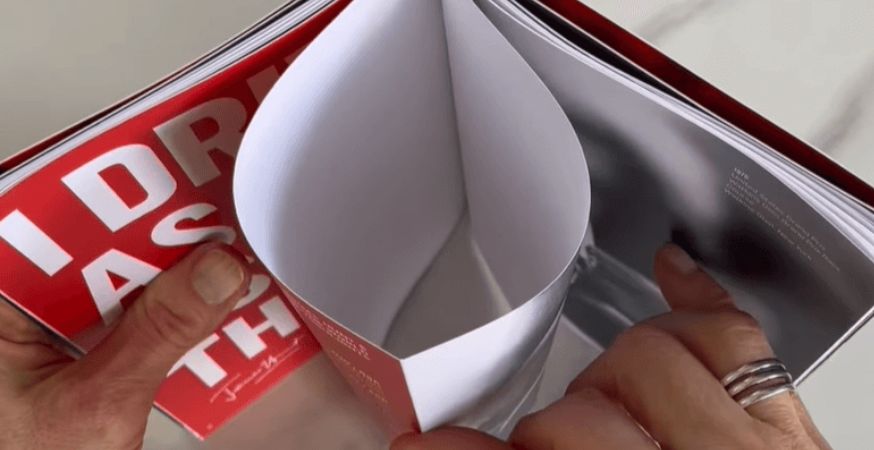Looking to elevate your print projects with a technique that’s both practical and visually striking? French fold book binding is a timeless approach that adds sophistication, gravitas, and intrigue to any design.
See French fold book binding in action in this video by Sabine Lenz at PaperSpecs:
What is French Fold Book Binding?
In French fold book binding, each sheet of paper is folded in half to create four panels. This technique leaves the front and back covers as the primary visible pages, while the open edges are bound together, often using perfect binding, to produce a sleek, polished look.

It’s important to distinguish French fold book binding from the French fold brochure technique (also known as a cross fold or half-half fold). In the brochure technique, a single sheet is folded twice, once in each direction, to create eight equal panels. French fold book binding, on the other hand, features only one fold and uses the folded pages as part of the binding process, resulting in a thicker, more substantial finished product.
French fold book binding is a popular choice for designers and printers for a few reasons:
- Increased page bulk: The folding process adds thickness to each page, making even a thin booklet feel substantial and premium.
- Hides bruising: Techniques like foil stamping, embossing, or letterpress printing can leave subtle bruises on the reverse side of the paper. The French fold book binding technique hides these imperfections, maintaining the integrity of your design.
- Avoids double-sided printing: The folded pages eliminate the need for double-sided printing, simplifying the process and allowing for more creative options.
Designer Tip: Make the Most of Folded Interiors
Sabine’s best pro tip for French fold book binding: Don’t let the interior of the folded pages go to waste! Here are two intriguing ideas she suggests to amp up your French fold book binding even more:
- Flood the interior pages with color: Add a contrasting color inside the folded pages for a striking visual effect.
- Add a hidden message: Use the interior space for an “Easter egg,” like a secret message or an unexpected design element.
These subtle additions can take your project from ordinary to extraordinary.
Paper Recommendations for French Fold Book Binding
The success of French fold book binding isn’t just about the folding and binding technique—it’s also about choosing the right paper. The paper you select can impact the look, feel, and durability of your finished piece, ensuring it achieves the premium, layered effect this binding style is known for.
Whether you’re designing a striking portfolio or art book, a high-end brochure, or a unique marketing piece, the right paper choice will enhance the tactile experience and elevate your project to the next level.
Let’s explore some paper recommendations perfect for French fold book binding. Here are some guidelines to follow:
- Sheet size: Since French folding requires each sheet to be folded in half, a larger or even folio-sized sheet is your best option. Smaller sheets can be used for smaller finished projects, but the smallest we recommend is 11″ x 17″.
- Basis weight: We recommend nothing heavier than 80 lb cover card stock to ensure each sheet can fold crisply without adding too much bulk to your finished project.
- Finish: Smooth or subtly textured finishes are perfect for this style of binding, such as vellum, felt, linen, or glossy.
- Coating: You can use coated or uncoated paper depending on the look and feel you want for your finished project.
Shop uncoated paper:
- CLASSIC CREST Solar White Paper – 28″ x 40″, 100 lb Text, Smooth Finish
- CLASSIC CREST Solar White Paper – 12″ x 18″, 100 lb Text, Smooth Finish
- SuperFine Ultrawhite Paper – 23″ x 35″, 80 lb Text, Eggshell Finish
- CLASSIC CREST Solar White Paper – 12″ x 18″, 80 lb Text, Eggshell Finish, Digital Press
Shop coated paper:
- Via Satin Pure White Paper – 25″ x 38″, 80 lb Text, Satin Finish
- Condat Digital White Paper – 12″ x 18″, 80 lb Text, Silk Finish, Digital Press
Shop uncoated smooth card stock:
- Finch Fine Opaque Bright White Card Stock – 17″ x 11″, 65 lb Cover
- Via Smooth Pure White Card Stock – 23″ x 35″, 80 lb Cover
- Via Smooth Pure White Card Stock – 26″ x 40″, 65 lb Cover
- CLASSIC CREST Avalanche White Card Stock – 18″ x 12″, 80 lb Cover
- Via Smooth Pure White Card Stock – 23″ x 35″, 80 lb Cover
- CLASSIC CREST Solar White Card Stock – 26″ x 40″, 80 lb Cover
Shop uncoated textured card stock:
- Pop-Tone Sweet Tooth Card Stock – 26″ x 40″, 65 lb Cover, Vellum Finish
- SuperFine Digital with i-Tone Ultrawhite Card Stock – 18″ x 12″, 80 lb Cover, Eggshell Finish
- Royal Sundance Ultra White Card Stock – 26″ x 40″, 65 lb Cover, Felt Finish
- Via Felt Digital I-Tone Bright White Card Stock – 18″ x 12″, 80 lb Cover, Felt Finish
- Basis Linen White Card Stock – 26″ x 40″, 80 lb Cover, Linen Finish
- Royal Sundance Brilliant White Card Stock – 18″ x 12″, 80 lb Cover, Linen Finish, Digital Press
Shop coated card stock:
- Kromekote White Paper – 26″ x 40″, 10 pt Cover, Glossy C/1S
- Kromekote White Paper – 18″ x 12″, 10 pt Cover, Glossy C/2S
- Kromekote White Paper – 17″ x 11″, 10 pt Cover, Glossy C/2S
Bring Your Designs to Life with French Fold Book Binding
French fold book binding is more than just a practical technique—Sabine at PaperSpecs shows us that it’s an opportunity to add depth, sophistication, and creativity to your print projects. Whether you’re looking to create a substantial booklet, protect your designs from printing imperfections, or surprise your audience with hidden design elements, this binding style offers endless possibilities.
By pairing this technique with the right paper and thoughtful design choices, you can transform a simple project into a memorable masterpiece. Ready to get started? Explore our premium paper selection to find the perfect fit for your French fold book binding project.
Let your creativity unfold—literally!
About PaperSpecs
Founded by award-winning graphic designer Sabine Lenz, PaperSpecs is an online hub dedicated to empowering graphic designers with a passion for print. Backed by Sabine’s 20+ years of print design experience in the U.S., Germany, and Australia, PaperSpecs provides designers with the swatchbooks, resources, insights, and tools they need to create innovative printed pieces to wow their current clients and attract new ones.
Through videos, webinars, blog posts, and more, PaperSpecs offers practical, up-to-date information about paper and printing technologies, helping designers stay informed about the latest trends and techniques in the design and print world. Check out the PaperSpecs YouTube channel for inspiration, advice, and more.
By joining the PaperSpecs community, designers gain access to beautiful print materials, expert advice, and a network of like-minded professionals, all aimed at elevating their print projects to new heights. Become a PRO member now.


